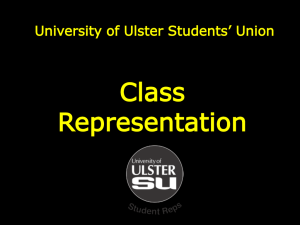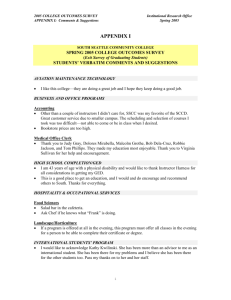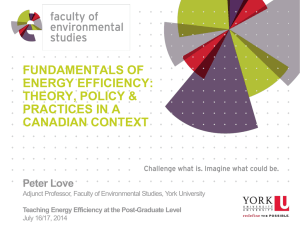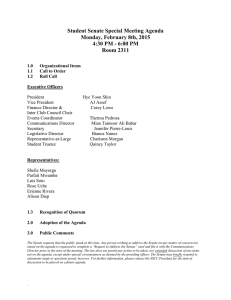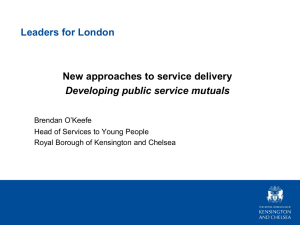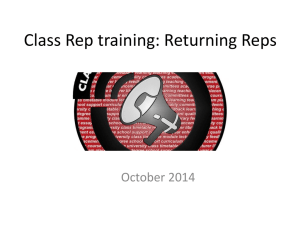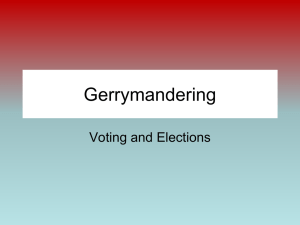Academic Board - Queen`s Students` Union
advertisement
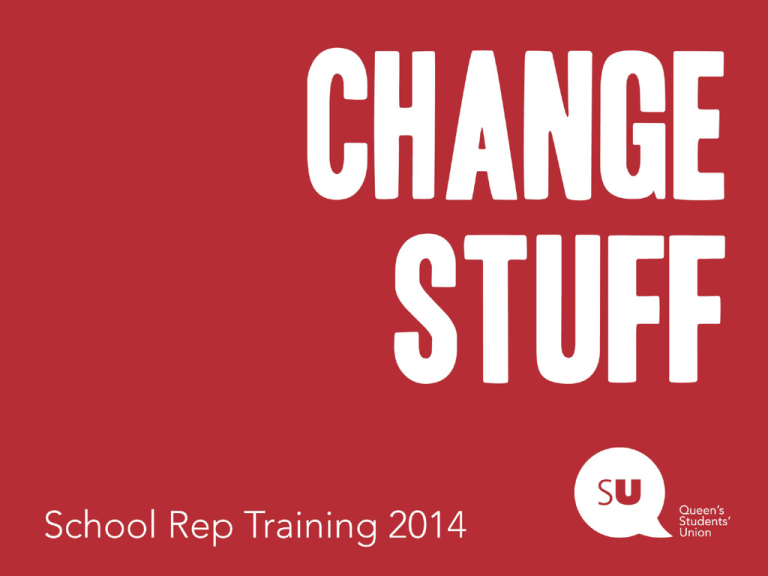
Who’s in the room? • • • • Are you a School Representative? If not - are you a Chairperson? If neither, what is your role? Who attended the introductory training session 3rd/5th November? What we will look at today • • • • • • The role of the School Representative Being a Chairperson Academic Board Students’ Union Council What is expected of you What support you will receive Icebreaker • • • • What is your name? What is your course / School? Why did you stand to be a School Rep? Tell us one thing that you’d like to change or improve about your School Overview of Student Representation Staff Student Consultative Committees (SSCCs) SSCCs are the platform for students and staff in the School to sit down to discuss and resolve academic and School related issues which arise. • • • • SSCC stands for Staff Student Consultative Committee It should meet ideally twice per semester There’s at least one in each School A student should chair the meeting The Format of SSCCs Members include: Chair (ideally a student), Secretary (member of staff / a student who takes minutes), Course Reps, relevant members of staff and other invited guests (such as School Societies). Before the meeting: • • • • Send any issues that you wish to be on the agenda Prepare for any issues that you wish to raise Read the minutes from the last meeting Receive the agenda and ensure you attend in good time. During the meeting: • • • • • • The Chair will announce apologies from those who can’t attend The Chair will ask if everything was ok with the minutes from the last meeting The SSCC will discuss issues on agenda Any other business will be discussed (any issues that have come up at the last minute) The SSCC will confirm an action list for issues raised during the meeting The Chair will confirm the time and place of the next meeting The Role of Chairperson • • • • • • • • • • • • Promote and support the aims and objectives of the Committee. Plan meetings and agendas, in collaboration with the Committee Secretary. Attend all meetings. Maintain an ongoing awareness of committee work between meetings. Chair the meetings fairly and impartially. Introduce agenda items. Do not dominate discussions and do not allow others to dominate discussions. Draw discussions to a clear and timely conclusion on each agenda item. Report to Committee members on developments and decisions. Help Committee members to participate. Read over and approve the agenda, minutes and other papers before these are sent out. Approve urgent and non-controversial matters on the Committee’s behalf between meetings. What Makes A Good Chairperson? • • • • • • • • • You will be a good listener. You will have good communication skills. You will be willing to listen to ways in which meetings can be improved. You will be impartial and have a reputation for fairness. You will be focused upon achieving the aims of the meeting. You will be able to summarise discussions fairly, clearly and succinctly. You will be able to politely shut down unproductive dispute and discussion. You will be willing to exert your authority when needed, but in a proper manner. You will be tenacious in ensuring that agreed actions are followed up and completed. Academic Board • This is essentially a University-wide SSCC. • Meetings: All in Students’ Union Club Rooms – 19th November 2014 at 1pm – 11th February 2015 at 1pm – 6th May 2015 at 1pm • See the Terms of Reference and other resources. Students’ Union Council • • • • • • • • • Meets on a monthly basis throughout the academic year – the next meeting is on Tuesday 18 November 2014. Information sessions are provided for all new members of the Council. The Council is the democratic governing body of the Students’ Union – its role includes decision making and policy creation. The Council is a debating forum – proposals for policy are brought forward, discussed and voted upon. The Council is essentially the ‘boss’ of the elected student officers. The Council oversees and analyses the work of the student officers. The Council should also help, support and motivate the student officers. The Council approves all applications to create new Clubs and Societies. All questions / inquiries regarding Council, contact Dominic Doherty (Clerk of Council) at D.T.Doherty@qub.ac.uk School Reps and the VP Education • Important relationship • 4 timetabled meetings in the academic year: – – – – – Wed 3 Dec, 2014 Thurs 12 Feb, 2015 Tues 10 Mar, 2015 Tues 28 Apr, 2015 All in the Anne Maguire Room, 5-7pm • Collating information School Reps and Course Reps • Another important relationship • Communicate – Have a pre-meet before SSCC meetings (SU Club Rooms are available) – Set up a Facebook page – Send out a group email • Collaborate to create a newsletter – A form of feedback to students – Forward newsletter to VP Education, include the names of all the contributors. Summary of Duties • Attend: – – – – – – SSCC meetings – dates specified by Schools Training Sessions – 3rd/5th November and 12th November Academic Board Students’ Union Council Meetings with the VP Education Other relevant committees in Schools (e.g. Education Committee) • Produce newsletter by collaborating with Course Reps – Disseminate to students and forward to VP Education and include names of contributors • Engage with Course Reps and students Training and Support • Introductory Training 3rd/5th November • School Rep Training 12th November • Access to workshops (not compulsory for degree plus) – BUT very useful for fulfilling your role • Group meetings with VP Education - Hannah Niblock • Ongoing support – email Hannah Niblock with any issues or queries: su.vpeducation@qub.ac.uk • Online Resources – www.qubsu.org – school rep section Benefits • Learn new skills • CV material • Networking opportunities • Background for future Representational roles • Good experience for future employment • Can be validated through ‘Degree Plus’ • Can be validated through Millennium Volunteers (Volunteer SU) – email Lucia Kearney l.kearney@qub.ac.uk (aged between 14-25) • Inspiring Leaders (Volunteer SU) – apply at beginning of Semester 2 • Make a difference!

